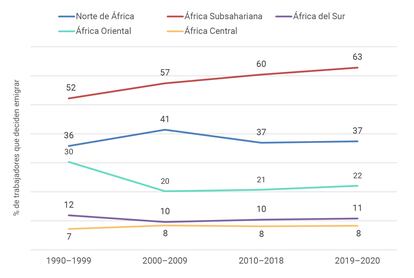There are many political actors who have insisted that the economic recovery be green and digital.
The situation of international instability, triggered by the invasion of Ukraine, has helped to strengthen this bet.
However, it would not only imply great technical challenges, but also in its human dimension.
The transition to renewable energies and digitization will demand even more highly-skilled workers, the same ones that are already in short supply today.
Under these circumstances, who would not want qualified immigration in their country?
The positions of the European parliamentary groups, always divided on the migration issue, seem to converge in this regard.
This consensus has been reflected in the review process of the Blue Card Directive, the process of which ended on October 7, 2021.
Conceived in 2009 to attract highly qualified labor from non-EU countries, it had proven ineffective.
The new directive seeks to make the European Union (EU) as a whole more attractive and overcome some of the limitations of the previous text.
It is clear that the EU cannot solve, in the short term, the labor shortage faced by these sectors without resorting to demographically stronger areas.
Source: Center for Global Development.
However, the general agreement between the political forces regarding the need to attract more skilled migration contrasts sharply with the EU's border control policy.
Within the field of labor migration itself, the absence of a reform for the Seasonal Workers Directive, aimed at less qualified sectors, is also obvious.
This occurs despite presenting important deficiencies for some time.
EU policy has established a double standard with extractivist overtones.
This practice that characterized nineteenth-century European colonialism, in which industrialized centers drained labor and raw materials from conquered territories a la carte, has mutated into more subtle forms.
On the one hand, a strict management of work permits is imposed on medium and low-skilled migrants, recruiting in their countries of origin and only for a certain time.
This system leaves migrants in the hands of their employers, often forced to accept deplorable housing conditions and lower wages than those offered to national employees.
This type of exploitation is well known in agriculture, which stands out for its seasonal work.
On the other hand, the aim is to attract the greatest number of highly qualified profiles from non-EU countries, offering them exceptional conditions and advantages compared to the previous category of workers.
Under this scheme, the interests of the European Union are prioritized, leaving aside the needs of the countries of origin.
Many times the recruitment is carried out in regions that cannot afford to do without this kind of professionals.
Source: Usman et al.
(2022).
Note: the percentage has been calculated based on the total number of highly qualified workers in each region.
The new Blue Card directive recognizes in its text the importance of reconciling the economic objectives of the Member States that demand qualified workers and those from which they emigrate.
However, the EU's efforts to prevent the brain drain from the countries that need it most do not seem to materialize as quickly as in the area of border security.
Perhaps the most promising bet is a set of pilot projects in which the EU is a part, encompassed within the so-called Global Skill Partnership.
These training programs carried out through bilateral agreements between a Member State and a non-EU country aim to train people in the country of origin and accompany those who wish to migrate, for example, to the EU.
Thanks to this agreement, the two countries achieve their objectives.
The receiver makes sure that the migration it receives meets the needs of its labor market, and the country of origin receives technology and financing to carry out the training.
These are aimed at both workers who intend to migrate and those who prefer to remain in the country and see their salary prospects increased.
Under this approach, the European economy does not take advantage of the efforts of impoverished countries, extracting a workforce that has been trained with difficulties and scarce resources.
Through these programs, the country of destination commits to increasing the total number of qualified profiles, thus balancing the balance.
The obsession with security monopolizes all the effort.
Projects to create new pathways for legal migration are developed only on the fringes
As promising as this initiative may be, it is far from being up to the challenge.
Currently there are only two projects involving European countries.
Meanwhile, the Blue Card Directive has been relaunched without including sufficient guarantees to prevent brain drain.
The obsession with security monopolizes all the effort.
Projects to create new pathways for legal migration are developing only on the margins.
The European Union needs to change its approach.
Play building sand castles on its borders with the curiosity to see if they withstand the tide.
Migrating is an unstoppable phenomenon and is born from one of the feelings that we most need in a world with enormous challenges: hope.
In any case, work can be done to help stabilize the rhythms with which displacements occur.
The problem is not immigration, but the economic, political and environmental crises that deteriorate people's living conditions.
Capturing talent from countries least able to do without it at all costs will only aggravate their situation and make them more vulnerable to the challenges they already face.
Pablo Sallabera Moszczynska
is a journalist at Fundación porCausa.
You can follow PLANETA FUTURO on
,
and
, and subscribe
to our 'newsletter'
here
.









